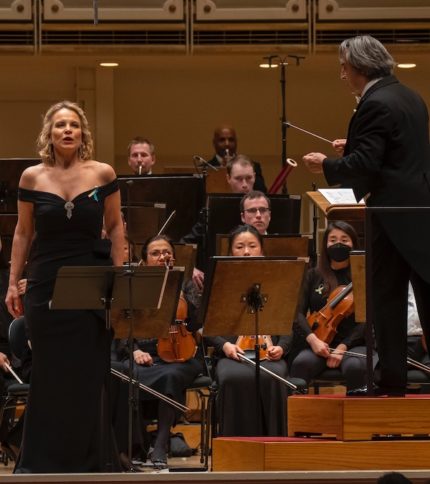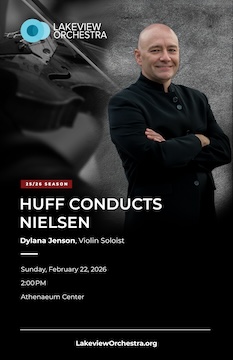Dark Mahler songs and bracing Bruckner from Muti, Garanča and CSO

Riccardo Muti’s lineup for this week’s Chicago Symphony Orchestra concerts offers one of his richest programs of the season: a world premiere, a German song cycle and an epic Viennese symphony.
Mahler symphonies have been less spotlit in the Riccardo Muti era than they have been historically for this long-esteemed Mahler ensemble. The composer’s vocal works have been rarer still, so it was gratifying to hear Muti lead the first CSO performance in 13 years of Mahler’s Rückert-Lieder with soloist Elīna Garanča Thursday night.
Though not planned as an integral cycle, Mahler’s five songs on texts by poet Friedrich Rückert are usually performed together. The lieder, written from 1901-2, are not flashy or virtuosic but more subtle and probing, and, as a set, offer a concise, gently varied echt-cycle with dark rumination predominating.
There is a current generation of celebrated opera singers at career peak, most of whom Chicago audiences have never heard sing in an opera. Garanča, sadly, is one of them, but at least these concerts offer a belated opportunity to experience the glamorous Metropolitan Opera star live in her CSO debut.
The Latvian singer possesses both a remarkable voice—a refined yet dusky, evenly produced mezzo-soprano— and world-class artistry, singing with unerring control and faultless intonation in the most exposed sections of this often quiet work
Garanča encompassed the whimsy of “Blicke mir nicht in die Lieder!” as surely as the romantic hush of “Ich atmet’ einen linden Duft!” In “Liebst du um Schönheit,” she moved naturally from playful caprice to a simple, understated declaration of love.
The singer was at her finest in the two most somber settings. Garanča rendered the existential psychic isolation of “Ich bin der Welt abhanden gekommen (“I am lost to the world”) with a moving, tender melancholy and concentrated depth of feeling. Scott Hostetler’s plangent English horn obbligato was exquisite and just as touchingly expressive as the soloist.
The concluding “Um Mitternacht” (“At Midnight”) segues from a hushed and broken solipsistic despair to the final stanza’s climactic (if not quite convincing) spiritual resurgence. Here Garanča showed her rich chest voice, rising slowly and inexorably in volume and emotion to the exultant peak and then descending to a hushed coda.
Garanča displayed sterling vocalism in these challenging settings and the only regret to be had was that Mahler’s Rückert-Lieder is only 17 minutes long. At times Muti seemed on the verge of overwhelming his soloist, but the balances stayed aligned and transparent, and the conductor elicited playing of comparable eloquence and sensitivity from the CSO musicians.
The evening began with the belated world premiere of Missy Mazzoli’s Orpheus Undone. This 2019 CSO commission stems from Mazzoli’s tenure as the CSO’s composer in residence (2018-21), which was itself undone by the Covid-19 pandemic.
Mazzoli is one of our most capable composers but Orpheus Undone proved a great disappointment, and this two-year-delayed debut virtually defined anticlimax. The work purports to represent the two crucial moments of the Orpheus myth: the death of Eurydice and the moment when Orpheus decides to follow his lover into the underworld.
You would think it would be difficult to not create some compelling musical drama out of the mythic scenario but Mazzoli somehow manages to do so. There are undeniably worthy moments as one would expect from such a colorful composer, not least the surging, swaggering swells of unison strings.
But the piece seems oddly over-scored while the orchestra’s resources are under-utilized. With one of the finest woodwind sections in the world, wind opportunites are barely mined apart from a brief clarinet solo near the end, well played by Stephen Williamson. The jumpy, chugging music leaps from section to section unconvincingly in a gestural, shallow manner without ever settling into a cogent and focused musical narrative.
Also, and strangely for a resourceful orchestrator like Mazzoli, the scoring seems off and even inept. The repeated wood block single note that opens the work provides little useful effect yet continues for an agonizingly long period, only to return later. Nowhere in Orpheus Undone is there any reflection of the faithful love or humanity of the epic tale that supposedly inspired Mazzoli to write this wayward piece.
As usual with commissioned works, Muti was at his best, and conductor and orchestra delivered strong and virtuosic advocacy for this scrupulously prepared and fiery premiere. But even these musicians couldn’t make a case for a score this noisy and barren.
Those looking to experience a more rewarding contemporary work, should check out Anna Thorvaldsdottir’s riveting Enigma, which will be performed by the Spektral Quartet next week at the Adler Planetarium’s Grainger Sky Theater.
Music of Anton Bruckner has been well represented in Muti’s 12 seasons as music director. The conductor has led performances of two-thirds of the canonic nine symphonies—all but Nos. 3, 5 and 8.
The Second Symphony was Muti’s first CSO Bruckner programming, performed in 2009, a year before he became music director. So it seemed fitting that he return to the same work this week, for his final Bruckner concerts with the CSO, at least as music director. (Bruckner is on tap in the 2022-2023 season, but led by guest conductors.)
Muti has provided the most consistent and illuminating Bruckner performances of any recent CSO music director, including Daniel Barenboim and Sir Georg Solti, both of whom recorded complete cycles with the CSO. And so it proved again Thursday night.
The Symphony No. 2 is an ideal introduction to the Austrian composer’s music, more concise and less repetitive than his later works. And one can imagine even Bruckner skeptics being won over by this gleaming and exhilarating performance.
Muti led a fleet yet acutely focused reading (Nowak edition from 1877 revision), one that consistently brought out the rustic quality as surely as the drama in the opening movement. A beguiling lightness of expression was manifest throughout with nothing too tense or overdriven—as with the folk-like charm of the secondary theme for strings and the bucolic wind playing by principal oboist William Welter and his woodwind colleagues. Muti directed and judged the ebb and flow with skill and restraint, contrasts underlined but not over-punched, even in the movement’s fiery coda.
The Andante was a warmly lyrical idyll, solemn as requested, yet also flowing with a natural rhythm, dynamics calibrated yet never overemphatic. There was fine atmospheric solo horn playing by principal David Cooper, and a hymn-like glow to the Benedictus theme from Bruckner’s Mass in F minor at the coda.
The Scherzo went with vehement rhythmic vigor and the stormy finale was ideally judged. Bruckner’s mercurial shifts and abrupt pauses can seem herky-jerky in lesser hands but Muti clearly had the final destination in mind. The performance maintained keen momentum while giving each contrasting episode and false ending their full due en route to a rousing and exultantly brassy coda.
The program will be repeated 1:30 p.m. Friday and 7:30 p.m. Tuesday. cso.org
Posted in Uncategorized






